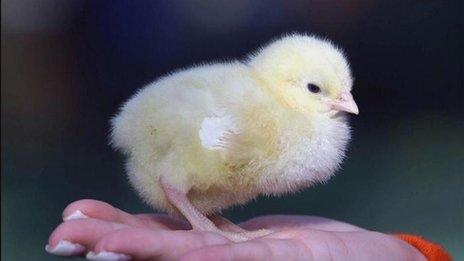Business start-ups: where one door closes...
- Published

The latest data suggests a pick up in entrepreneurial activity in Scotland
She smiles as she clutches the sustainable packaging of her ethically-sourced dog snacks. Chris, from East Kilbride, put her redundancy money, with some grant funding, into a new firm, Pawsitively Natural.
She started by baking biscuits for one of her own dogs which has a sensitive stomach. She uses ingredients of a quality that humans could eat. Back by input from university nutritionists (one of three university collaborations), a key ingredient is seaweed sourced from the Isle of Lewis.
This is hardly the highest-tech of products. The next Google it ain't. But it's not short of ambition. Chris reels off figures for the size of the dog snack market in Britain, and then starts talking billions of dollars in the US. That's where she wants to take the business.
Such ambition is expected, if not required, among the 35 temporary residents now at the Entrpreneurial Spark, a 'hatchery' for business 'chicklets' in Glasgow, which is partnered with similar units in Ayrshire and Edinburgh, each mentored by one of Scotland's more successful entrepreneurs; Sir Willie Haughey, Sir Tom Hunter and Ann Gloag.
They are conditioned into reeling off metrics for their markets. 'Go Do', goes the mantra. "Get comfortable with being uncomfortable."
Although participants were given up to a year of free accommodation and the opportunity to network and learn from each other, as well as mentoring support, the pace of start-ups is being accelerated. From August, each successful applicant will have only five months, before being pushed out the nest.
Spring in the step
This story has become better known due to The Entrepreneurs, two TV documentaries recently broadcast on BBC Scotland, following several people taking part in the E-Spark process. The publicity has brought in a lot of applications for the next intake.
And the mindset is becoming more familiar to more Scots, if the latest findings from Strathclyde Business School are any guide.
Professor Jonathan Levie and his research team have been feeding Scottish data into a giant programme of measuring early-stage entrepreneurial activity across 27 countries.
And until recently, it's been a fairly dismal experience. Two years ago, he was talking about 'a lost generation' through the low and declining level of business start-ups in Scotland. Scotland seemed stuck for keeps in the bottom quartile.
This week, however, he's got a spring in his step. The story from Scotland is showing signs of turning round. It's into the second quartile, while some of its 'Arc of Prosperity' northern European role models have fallen behind.
This is not sufficiently established to be a clear trend, but there have been a couple of years of heading in the right direction. And the 2012 figures look like an acceleration of that.
http://www.bbc.co.uk/news/uk-scotland-scotland-business-22787173
Near necessities
There is no definite explanation, but there are some pointers. Graduates are a significant part of the growth. And as the proportion of graduates in the population is itself rising, following university expansion over the past 25 years, there may be built-in growth to come.
That's partly because university courses are encouraged to stimulate students to think in terms of striking out and setting up on their own.
It is also an unfortunate truth that the graduate jobs market has been grim for years, and looks set to stay that way. Setting up in business is not only possible, but a near necessity for many.
It's also being forced on many people who are being pushed out of salaried jobs, often with a reasonably generous pay-off, which - like Chris Louttit - they plough into the Next Thing.
Don't assume they're all living their dreams. The anecdotal evidence is of many mid-career people struggling to make a go of the self-employed or freelance life, perhaps doing what they had already been doing.
Companies can use them as and when they wish, as a means to flex their workforce. But that means it's a job without the security of regular employment. Productivity is poor.
This is not an easy time to be carving a market niche. And it's striking how much the improvement in Scotland's approach to entrepreneurial activity is among those with little aspiration to grow firms and expand employment.
Amid all this good news on business formation, the number of people wanting to grow firms and employ more people hasn't shifted much at all.
Homecoming
And then there are the migrants. These interest me, just as they are a focus of Professor Levie's work. He's a migrant into Glasgow himself, coming from Ireland.
It's no surprise that migrants have more entrepreneurial nous than the stay-at-homes. They've got the get-up-and-got for them to have got up and gone. Making a new start is what they're all about, so a new start in business is natural territory. And there's not so much of a link between degree level education.
In Scotland, you can easily see that Asian-Scots are no strangers to business formation. But it's clear from this research that incomers from within the UK are also much more likely to be setting up in business, or at least to be actively planning to do so. That's particularly true of those over 50.
The reverse effect - of Scots with innovation and success in their sights, heading south of the Border - is also evident. And there's nothing new about that.
But Professor Levie highlights his concern that those aged between 30 to 50 are particularly likely to have left, and he asks us to consider the question of what could be done to keep the 40,000 exiled Scots he reckons could be contributing to the Scottish economy. That's out of 733,000 people born in Scotland most recently counted living elsewhere in the UK.
Contrasting his observation of Scotland with his experience of back home in Ireland, he says emigration is a trauma there. He talks of Irish mothers seeing it as their role to post details of local jobs to get their offspring back to the Emerald Isle. He says that virtually every village will have a Welcome Home Week, with events to entice the wandering Irish back home.
Scotland's emphasis is on more on building a network of those with an affinity and a desire to be involved from a distance. The Homecoming in Scotland, in its second incarnation next year, seems aimed more at tourism spend by the settled diaspora of Scots, with dollars to burn rather than an itch to get back to put down roots in the old turf.
Giant magnet
But what if it were different? What about attracting back those 40,000 exiles? What would that take?
In practical terms, the team at Strathclyde's Hunter School of Entrepreneurship suggest a better focus on growing firms, both in getting the right skills in place and the right finance. That means better exit routes for angel investors, to allow venture capital to step in and move the firm to the next level, while the angel investor returns to help with entry at the ground floor.
They also talk about better connections, and mentoring by role models, all of which seems to me to be rather abundant - if you're not too backward about coming forward.
And then there's that familiar London effect. Not only is it a giant magnet for people with ideas, skills and energy. But it also spins out business activities as they expand, as well as people looking for quality of life. Chris Louttit couldn't be happier, she says. After more than 20 years in an administrative role in the Crown Office, she took redundancy, and now she's living the dream.
- Published22 February 2013

- Published15 February 2013

- Published19 March 2012

- Published4 November 2011

- Published5 October 2011
